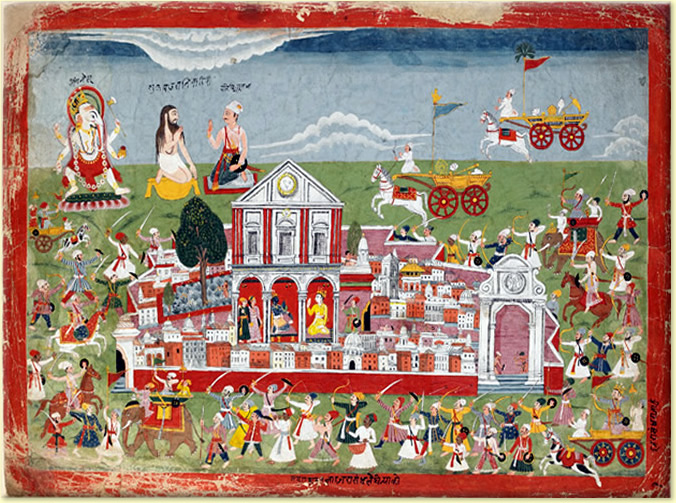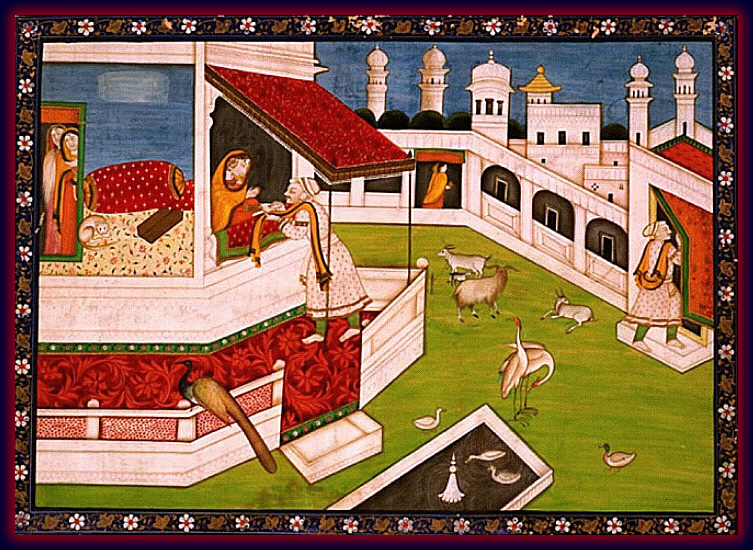Chapter 52: The Lords Leap from a Mountain and Rukminî's Message to Lord Krishna
(1)
S'rî
S'uka said: 'In this manner, my dear, being graced by Krishna
circumambulated the descendant of Ikshvâku Him bowing
down and left he through the mouth of the cave.
(2)
Noticing that the human beings, the animals, plants and trees
were all in a poor condition concluded he that Kali-yuga had
arrived and went he in the northern direction [compare
1.15:
44].
(3)
With faith in the process of penance was he, seriously detached
from a materially motivated association with people, freed from
doubts and thus having fixed his mind upon Krishna he reached
the mountain Gandhamâdana ['the nice smell'].
(4)
Reaching Badarikâs'rama [see e.g. 3.4:
4; 4.12:
16; 5.4:
5; 7.11:
6], the residence
of Nara-Nârâyana, worshiped he, with respecting all
duality, the Lord from the peace he had found with his
austerity.

(5)
The
Supreme Lord turned back to His city Mathurâ that was
surrounded by the Yavanas and brought, after killing the
barbarian army, their riches to Dvârakâ.
(6)
As Acyuta by oxen and men was engaged in taking the wealth,
arrived there Jarâsandha leading twenty-three armies.
(7)
Seeing the powerful waves of soldiers of the enemy armies ran
the two Mâdhavas, adopting a human course, o King,
quickly away. (8)
Abandoning the load of goods acting like cowards who are
afraid, covered They, actually not afraid at all, with Their
lotuspetal feet many yojanas. (9)
Seeing the Two fleeing laughed the mighty ruler of
Mâghada loudly and pursued he with charioteers and
soldiers the Lords, not being quite aware of Their special
nature. (10)
Having put Their powers to a test full speed having run a long
distance, climbed They a very high mountain known as
Pravarshana ['the rainy one'] where the mighty one
[Indra] is always showering rains. (11)
Knowing that They were hiding on the mountain, but not exactly
where o King, set he, with firewood igniting fires on all
sides, the mountain ablaze. (12)
Quickly leaping down from it being eleven yojanas high
and burning on all sides, fell They to the ground.
(13)
Not being seen by Their opponent or his helpers returned the
two finest Yadus to Their city which had the ocean as its moat,
o King. (14)
The king of the Magadhas on his part mistakenly thought that
Balarâma and Kes'ava had burned in the fire and went to
Magadha pulling back his huge force. (15)
As previously stated gave the opulent sovereign of
Ânarta, named Raivata, on the order of Brahmâ
Balarâma his daughter Raivatî in marriage
[9.3:
33-36].
(16-17)
Govinda the Supreme Lord Himself, married, o hero among the
Kurus, Vaidarbhî [Rukminî] the daughter of
Bhîshmaka, to her own choice. She was a plenary portion
of the goddess of fortune. By force overruling S'âlva and
other kings in support of S'is'upâla, accomplished He
this [by stealing her away] before the eyes of all the
people, just like the son of Târkshya [Garuda,
stole] the nectar of heaven.'
(18) The honorable king said: 'In the manner of a Râkshasa [by kidnapping thus], so I heard, married the Supreme Lord thus Rukminî, the daughter of Bhîshmaka with the charming face. (19) O lord, I'd like to hear about how Krishna stole away the bride, with His immeasurable potency defeating such kings as Jarasândha and S'âlva. (20) O brahmin! Who can ever all understand what is said and get enough of hearing about the always new [see 10.45: 48] propitious, delightful topics of Krishna which remove the contamination of the world?'
(21) The son of Vyâsa said: 'There was a king named Bhîshmaka, the great ruler of Vidarbha, of whom there were five sons and one daughter with an exceptionally pretty face. (22) Rukmî was the first born son, followed by Rukmaratha, Rukmabâhu, Rukmakes'a and Rukmamâlî; Rukminî their sister was of a saintly character [rukma means: 'what is bright or radiant']. (23) She, from hearing Mukunda's beauty, prowess, character and opulences being sung by those who came to her family home, deemed Him a suitable husband. (24) Krishna, finding her as a repository of intelligence, auspicious marks, magnanimity, beauty, good behavior and other qualities a suitable wife, then took the decision to marry her. (25) Even though the family wanted to give the sister to Krishna o King, was this by Rukmî, who hated Krishna, prevented; he thought more of S'is'upâla. (26) The princess of Vidarbha with her dark eyes unhappy with that knowledge, pained her mind and quickly sent a certain dependable brahmin to Krishna. (27) He, arriving at Dvârakâ, brought inside by the gatekeepers saw the Original Person seated on a golden throne. (28) The Lord Good to the Brahmins seeing him got down from His throne, seated him and performed worship the way the residents of heaven worship Him. (29) With him having eaten and rested approached the Goal of the Saintly Devotees him in order to personally give him a massage for his feet and asked He him patiently: (30) 'My best, are the religious practices sanctioned by your first-class, twice-born seniors, proceeding without too much difficulty and are you always happy within? (31) When a brahmin satisfied carries on with whatever [comes his way], not falling short in his religious duty, will those [practices] for him every way be the cow of plenty. (32) Dissatisfied will he, even though he is the master of the godly, again and again end up in various worlds; but satisfied will he, even though destitute, rest with all his limbs free from pain and fever. (33) To the learned who are satisfied with their progress [in self-realization] I bow My head again and again because they, void of false ego, are of the saintly and of all living beings, peaceful as they are the best well-wishers [see also B.G. 2: 71, 12: 13-14]. (34) Are you faring well with what the king all does, o brahmin? For the king whose subjects are happy to live protected in his state is very dear to Me. (35) From where, crossing the [ocean of] troubles, did you arrive here and for what purpose; please tell Us everything, if its not a secret; what is it We may do for you?'
(18) The honorable king said: 'In the manner of a Râkshasa [by kidnapping thus], so I heard, married the Supreme Lord thus Rukminî, the daughter of Bhîshmaka with the charming face. (19) O lord, I'd like to hear about how Krishna stole away the bride, with His immeasurable potency defeating such kings as Jarasândha and S'âlva. (20) O brahmin! Who can ever all understand what is said and get enough of hearing about the always new [see 10.45: 48] propitious, delightful topics of Krishna which remove the contamination of the world?'
(21) The son of Vyâsa said: 'There was a king named Bhîshmaka, the great ruler of Vidarbha, of whom there were five sons and one daughter with an exceptionally pretty face. (22) Rukmî was the first born son, followed by Rukmaratha, Rukmabâhu, Rukmakes'a and Rukmamâlî; Rukminî their sister was of a saintly character [rukma means: 'what is bright or radiant']. (23) She, from hearing Mukunda's beauty, prowess, character and opulences being sung by those who came to her family home, deemed Him a suitable husband. (24) Krishna, finding her as a repository of intelligence, auspicious marks, magnanimity, beauty, good behavior and other qualities a suitable wife, then took the decision to marry her. (25) Even though the family wanted to give the sister to Krishna o King, was this by Rukmî, who hated Krishna, prevented; he thought more of S'is'upâla. (26) The princess of Vidarbha with her dark eyes unhappy with that knowledge, pained her mind and quickly sent a certain dependable brahmin to Krishna. (27) He, arriving at Dvârakâ, brought inside by the gatekeepers saw the Original Person seated on a golden throne. (28) The Lord Good to the Brahmins seeing him got down from His throne, seated him and performed worship the way the residents of heaven worship Him. (29) With him having eaten and rested approached the Goal of the Saintly Devotees him in order to personally give him a massage for his feet and asked He him patiently: (30) 'My best, are the religious practices sanctioned by your first-class, twice-born seniors, proceeding without too much difficulty and are you always happy within? (31) When a brahmin satisfied carries on with whatever [comes his way], not falling short in his religious duty, will those [practices] for him every way be the cow of plenty. (32) Dissatisfied will he, even though he is the master of the godly, again and again end up in various worlds; but satisfied will he, even though destitute, rest with all his limbs free from pain and fever. (33) To the learned who are satisfied with their progress [in self-realization] I bow My head again and again because they, void of false ego, are of the saintly and of all living beings, peaceful as they are the best well-wishers [see also B.G. 2: 71, 12: 13-14]. (34) Are you faring well with what the king all does, o brahmin? For the king whose subjects are happy to live protected in his state is very dear to Me. (35) From where, crossing the [ocean of] troubles, did you arrive here and for what purpose; please tell Us everything, if its not a secret; what is it We may do for you?'


